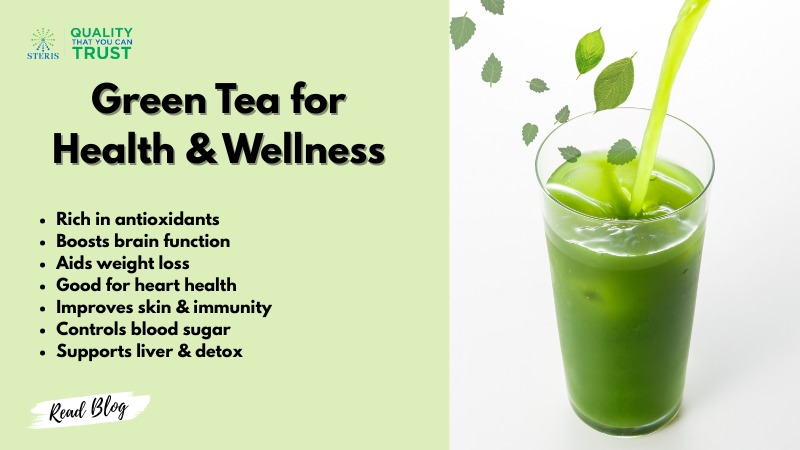Benefits and Side Effects of Green Tea: A Complete Guide
Sep 14, 2025
Green tea is one of the most popular beverages in the world, valued for its refreshing taste, medicinal properties, and cultural heritage. Made from the leaves of Camellia sinensis, green tea undergoes minimal processing compared to black tea, which helps preserve its antioxidants and polyphenols. While it has countless benefits, excessive consumption may lead to side effects.
Health Benefits of Green Tea
1. Rich in Antioxidants
Green tea contains catechins (especially EGCG – epigallocatechin gallate) that help fight free radicals, reducing oxidative stress and lowering the risk of chronic diseases.
2. Boosts Brain Function
The caffeine in green tea, though less than coffee, improves alertness and focus. Combined with L-theanine, it promotes relaxation and better concentration.
3. Supports Weight Loss
Green tea boosts metabolism and helps in fat oxidation, especially when consumed before exercise. Many weight-loss supplements contain green tea extract.
4. Good for Heart Health
Regular consumption improves cholesterol levels, lowers blood pressure, and may reduce the risk of cardiovascular disease.
5. May Reduce Risk of Cancer
The antioxidants in green tea are linked to a lower risk of certain cancers like breast, prostate, and colorectal cancer.
6. Improves Oral Health
Green tea catechins inhibit the growth of bacteria, reducing bad breath and risk of cavities.
7. Controls Blood Sugar Levels
Green tea may improve insulin sensitivity and lower blood sugar levels, making it beneficial for people with type 2 diabetes.
8. Supports Skin Health
Topical or oral use of green tea reduces acne, delays aging signs, and protects against sun damage.
9. Enhances Liver Function
Green tea helps reduce fat deposits in the liver and supports detoxification.
10. Improves Immunity
Its polyphenols and antioxidants strengthen the immune system, helping the body fight infections.
Side Effects of Green Tea
While green tea is generally safe, overconsumption (more than 4–5 cups daily) may cause:
-
Caffeine Sensitivity
Can cause insomnia, restlessness, rapid heartbeat, or headaches in sensitive individuals. -
Iron Absorption Issues
Excessive green tea may reduce iron absorption, leading to anemia over time. -
Stomach Upset
Drinking green tea on an empty stomach may cause nausea, acidity, or digestive issues. -
Liver Toxicity (Rare)
High doses of green tea extract supplements (not tea itself) can harm the liver. -
Pregnancy Concerns
Excessive caffeine from green tea may not be safe during pregnancy. Moderation is key.
Frequently Asked Questions (FAQ) on Green Tea
1. How many cups of green tea should I drink daily?
2–3 cups per day are considered safe and beneficial. Avoid exceeding 5 cups.
2. Is green tea good for weight loss?
Yes, it boosts metabolism and fat burning, especially when paired with exercise and a healthy diet.
3. Can I drink green tea on an empty stomach?
It’s better to avoid it on an empty stomach as it may cause nausea or acidity. Drink after meals instead.
4. Which is better: green tea or black tea?
Green tea has more antioxidants due to less processing, while black tea has a stronger flavor and higher caffeine. Both have health benefits.
5. Can pregnant women drink green tea?
Yes, but in moderation (1–2 cups daily). Too much caffeine may affect pregnancy. Always consult a doctor.
6. Does green tea help in glowing skin?
Yes, its antioxidants fight acne, reduce aging signs, and promote healthy skin.
7. Is green tea safe for children?
Occasional, mild consumption is safe for older children, but not recommended for toddlers due to caffeine content.
8. What is the best time to drink green tea?
- Morning after breakfast
- Before workouts
- Early evening (not too late as caffeine may disturb sleep)
9. Can green tea cause insomnia?
Yes, if consumed late in the evening, its caffeine can disrupt sleep.
10. Does green tea interact with medicines?
Green tea may interfere with some medications (like blood thinners, stimulants, or iron supplements). Consult a doctor if on medication.
Key Takeaway
Green tea is a natural health booster with powerful antioxidants, weight management benefits, and heart protection. However, moderation is crucial to avoid side effects like insomnia or stomach issues. A balanced approach—2–3 cups daily—gives you the benefits without risks.
Recent Post

Why Calcium Citrate Maleate with K2-7 & Magnesium Bisglycinate Is Superior for Osteoporosis

EUROSOFT 4D Skin Cream for Clear, Healthy-Looking Skin

Steris Healthcare ELIGOLUX – Effective Solution for Endometriosis Pain Management

What is the Olmesartan, Cilnidipine, and Chlorthalidone Combination Pill For?

How Multivitamin, Multimineral and Amino Acid Tablets with Taurine & Ginseng Support Active Lifestyles

Cinacalcet Tablets 60 mg: When They’re Used and What to Expect

What to Expect When Taking Opipramol 100 mg: A First-Timer’s Guide

How Do Empagliflozin, Linagliptin, and Metformin ER Work Together for Diabetes Control?

Why Doctors Prescribe Pregabalin with Epalrestat and Methylcobalamin for Nerve Pain Steris Healthcare.

Steris Healthcare Pvt Ltd Radiates Excellence at the Dec 2025 ZEE Media Global Innovation & Leadership Summit, London!

